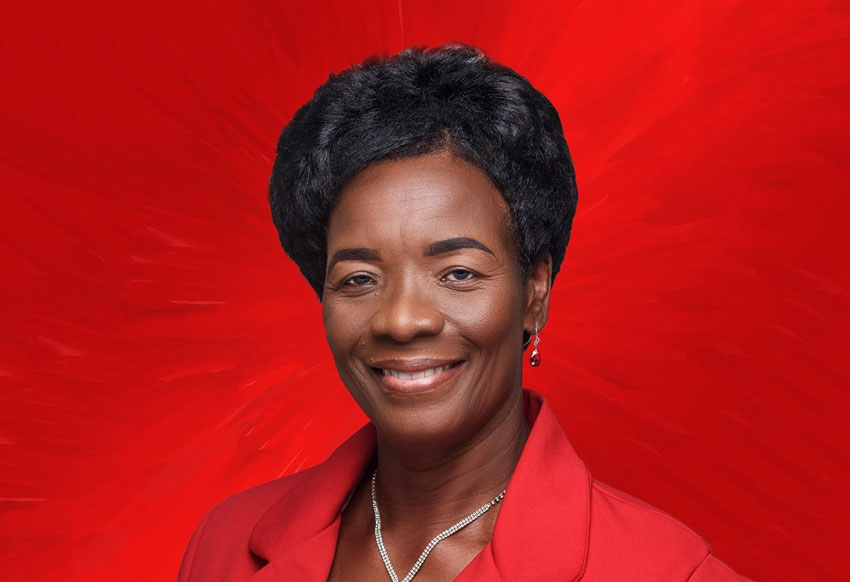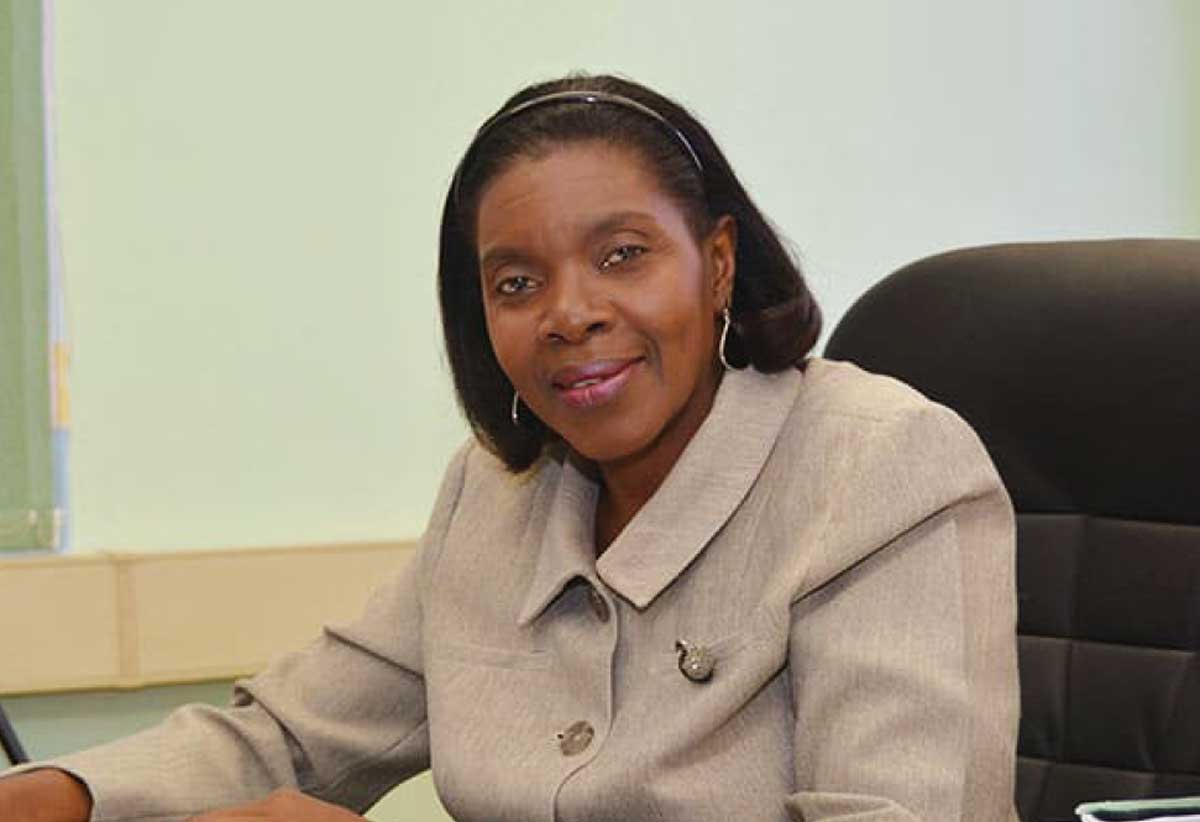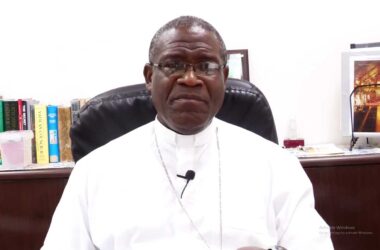While public protest and political chivalry emanated outside the house of parliament on Tuesday (March, 8) International Women’s Day –it was the resounding voice and rallying cry from social activists and legislators that took the spotlight on this undoubtedly, ‘all important’ day.

Minister for Gender Affairs Dr. Virginia Poyotte championed the cause for gender equality, saying that the bill will provide law enforcement officers with ‘more teeth’ to deal with purported perpetrators. This year’s International Women’s Day was observed under the theme: “Gender Equality today for a Sustainable Tomorrow”.
In her delivery, Dr. Albert-Poyotte described the presentation of the Domestic Violence Bill as a “gift from this government”, adding that with the SLP’s mantra of putting people first, this bill is directed at “putting women first”.
“Gender Equality is still only an aspirational goal in many regions of the world …and attempts at making gender equality a reality in our world has been met with resistance, festering for centuries to the point where it became the norm,” declared the Gender Affairs minister.
She said the “unexpected shattering” that Covid-19 has brought to bear on nations, “exposed inefficiency, and costs of inequality in a way that it has never been before”.
Global agencies have called for a renewed approach to building back a national economic recovery through gender equality initiatives, with the UN Secretary-General stating, “The numerous policy … prepared for centuries since the pandemic have all acknowledged that: Gender Equality is indispensable to sustainable development”.
“Gender mainstreaming and social protection are identified as one of the three cross-cutting thematic developmental areas in St Lucia’s medium-term development strategy, along with disaster risk management, resilience, sustainable development and productivity, and economic competitiveness,” noted Dr. Albert-Poyotte.
Stating that over the past two years, several strides have been made within the region to uphold and cement a joint base for gender equality, she asserted: “The improved understanding of gender in national development made possible through public sector capacity enhancement, coincided with other national and international initiatives that highlighted the indispensable role of gender equality in sustainability development,” said the minister.
She disclosed that the government through the department of gender affairs is embarking on “the establishment of a gender-equality focal point system in the public sector, to ensure that gender is mainstreamed in all national development planning”.
On behalf of the women in Saint Lucia and the wider diaspora, Dr. Albert – Poyotte declared: “Women in St Lucia stay strong, let us work together to build a better future, not just for ourselves, but for our children and the future generation.”

Commerce Minister Emma Hippolyte another female member in the Cabinet of the St Lucia Labour Party (SLP) administration expressed her support for the Domestic Violence Bill, which was legislated at Tuesday’s parliamentary sitting. She acknowledged the input of the family court, law enforcement officers, and social service departments that have assisted in dealing with “family disputes”.
Citing the need to care for the welfare of the citizenry, especially victims of domestic abuse, Hippolyte quipped: “How (does) this current Domestic Violence Bill make a difference in the lives of the people?”
The Soufriere MP said she was comforted in knowing that “this bill has received significant stakeholder discussion …and support groups such as Raise Your Voice, the legal fraternity, various government ministries, and agencies, as well as international agencies, such as Sisters for Change, all contributed to the piece of legislation that is before us.”
Hippolyte noted that in tabling this piece of the legislature it was equally important to focus on “gender equity, “women empowerment as well as, economic empowerment.”
Prime Minister Philip Pierre endorsed the bill, stating poignantly that all forms of violence within the communities must be suppressed.
He opined that “domestic violence stems from the home” and therefore it was crucial that parenting plays a part in helping to nurture children; while pushing for parents to take on the responsibility as ‘role models’ for their children in a more conducive communal setting, with lees violent upheavals.

Noting that violence need not be the last resort to solving disputes, Pierre stressed: “This idea of violence must stop. We have to stop the abuse and intimidation…and sometimes a lot of it comes through selfishness and arrogance, and the belief that we always have to be right and we cannot admit that we’re wrong, ” or even when persons fail to admit that they made a mistake.
He added, “Whereas this bill has all the requirements, its modern legislation” nonetheless, in these times, the government is hampered with managing an over-loaded national financial plan.
The prime minister reiterated his stance that, “Violence must stop” and people need to employ more sociable methods to handle disputes.
Veteran legislator and MP for Vieux Fort South, Dr. Kenny Anthony advocated for a bolder and wider ‘community education’ campaign to warn citizens against domestic flare-ups and ways to manage conflict resolution.
He said Saint Lucia has always been at the forefront of legislative reform on this issue in the region and acknowledged the support of the many women that have helped to ‘champion this cause’.
Dr. Anthony noted that though Saint Lucia maintains its place as a “pioneer in social legislation”, there is still a long way to go in bringing about an equitable resolution and ‘succession rights ’ to persons from wider family circles, such as illegitimate children and other domestic and cohabitating settings.
The former prime minister emphasized that “sociological problems” are at the crux of the issue, “but the reality is unless we tackle those sociological problems in our communities ad in our societies, there is only so much that this legislation will do and so much that this legislation can achieve.”
He asserted: “Side by side with this legislation, we have to develop a culture against violence.”
Dr. Anthony said that while violence is mostly identified as ‘crime’ and violent behaviour, however, “there is a deeper issue of violence embedded in our homes …in our society, embedded in our communities and we have to tackle it.”
He said there needs to be a mechanism in place to “preach anti-violence in the communities” and to take on a huge societal effort to deal with the problem and state unequivocally that, “no form of violence, whether it is against women…men or children is acceptable and must be frowned upon and disowned.”


![Simón Bolívar - Liberator of the Americas [Photo credit: Venezuelan Embassy]](https://thevoiceslu.com/wp-content/uploads/2025/12/Simon-Bolivar-feat-2-380x250.jpg)






